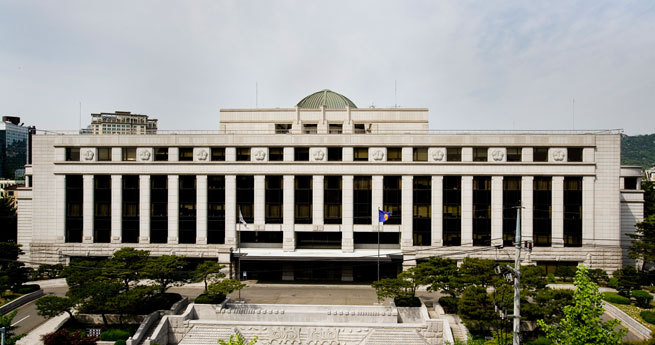No constitutionality dispute in Seoul-Tokyo deal on WWII sex slavery: court
By Kim ArinPublished : Dec. 27, 2019 - 14:21
South Korea’s Constitutional Court on Friday said it found no apparent points of constitutional contention in the 2015 Seoul-Tokyo deal over Japan’s sexual enslavement of Korean girls and women during World War II.
The court said it would dismiss the constitutional complaint filed by 29 survivors of sexual slavery at Japanese military brothels and 12 family members of deceased victims.
The court’s decision came after three years and nine months of deliberation.
“The agreement in question is political in character, and the kind of assessment it demands should also be a political one,” the court said.
“This does not warrant an arbitration of constitutional validity.”

Following the complaint’s dismissal, the Ministry of Foreign Affairs said in a statement that it respected the decision of the court.
The ministry also said it would “continue to exert all possible efforts to console and restore the honor of the victims.”
On Dec. 28, 2015, the administration of then-President Park Geun-hye and the Japanese government reached an agreement to put the issue of wartime atrocities against the Korean women to rest once and for all.
Under the settlement, which was meant to be “final and irreversible,” Tokyo would admit its responsibility in the Korean women’s enslavement by the Japanese military and provide 1 billion yen ($9.13 million) to establish a foundation for victims.
The decision was met by protest from Korean survivors of the WWII sexual slavery and their family.
Representing the victims and family, Lawyers for a Democratic Society, better known by its Korean acronym Minbyun, lodged a complaint at the Constitutional Court against the deal in 2016, claiming it infringed on victims’ rights to demand compensation from the Japanese government.
“The South Korean government excluded the victims in the negotiation process, and failed to adequately explain the contents of the agreement after it was signed,” the progressive lawyers’ group said.
The foreign affairs ministry submitted an opinion in June last year asking the court to reject Minbyun’s complaint, claiming that the 2015 deal was a diplomatic accord as opposed to a legally binding treaty.
In response, the Constitutional Court said its sole consideration will be whether the constitutional rights of citizens had been violated.
By Kim Arin (arin@heraldcorp.com)








![[Graphic News] More Koreans say they plan long-distance trips this year](http://res.heraldm.com/phpwas/restmb_idxmake.php?idx=644&simg=/content/image/2024/04/17/20240417050828_0.gif&u=)
![[KH Explains] Hyundai's full hybrid edge to pay off amid slow transition to pure EVs](http://res.heraldm.com/phpwas/restmb_idxmake.php?idx=644&simg=/content/image/2024/04/18/20240418050645_0.jpg&u=20240419100350)






![[From the Scene] Monks, Buddhists hail return of remains of Buddhas](http://res.heraldm.com/phpwas/restmb_idxmake.php?idx=652&simg=/content/image/2024/04/19/20240419050617_0.jpg&u=20240419175937)

![[KH Explains] Hyundai's full hybrid edge to pay off amid slow transition to pure EVs](http://res.heraldm.com/phpwas/restmb_idxmake.php?idx=652&simg=/content/image/2024/04/18/20240418050645_0.jpg&u=20240419100350)

![[Today’s K-pop] Illit drops debut single remix](http://res.heraldm.com/phpwas/restmb_idxmake.php?idx=642&simg=/content/image/2024/04/19/20240419050612_0.jpg&u=)